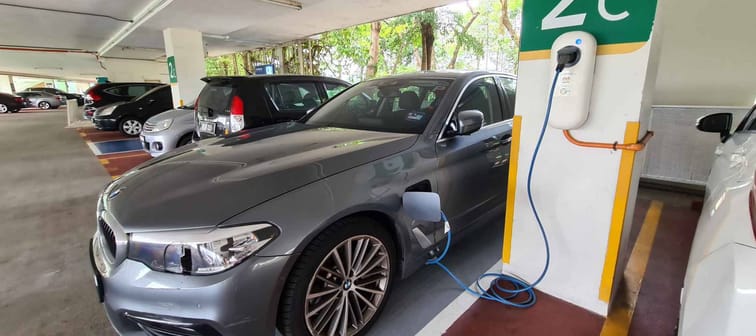What is an electric vehicle?
EVs can be either 100% electric, where they rely only on their batteries and require an external charge, or they can be a hybrid, where they use a combustion engine to start but switch to electricity under specified conditions.
There are two types of hybrids:
- Standard hybrid: one that doesn't need an external charge and can generate some electricity by absorbing the force applied when you hit the brakes.
- Plug-in hybrid: one that plugs in and relies on more powerful batteries. Plug-in hybrids perform more like a true electric car and less like normal gas-powered vehicles.
Discover how a simple decision today could lead to an extra $1.3 million in retirement
Learn how you can set yourself up for a more prosperous future by exploring why so many people who work with financial advisors retire with more wealth.
Discover the full story and see how you could be on the path to an extra $1.3 million in retirement.
Read MoreIs an electric car worth it financially?
The biggest benefit is that it costs less to operate an electric car compared to a conventional gas-powered car.
At time of writing, the Department of Energy says it costs $2.18 for a gallon of gas, while the electrical equivalent (known as an eGallon) costs $1.21. So, if you need 600 gallons a year, it'll cost you $1,308 a year to fill up with gas, while with an EV, you'd spend $726 a year.
It's not all about fuel, though. According to AAA, a small sedan like a Honda Civic costs 8.36 cents per mile in fuel, while a full-electric EV like a Kia Soul costs 3.65 cents in the equivalent electricity. Plus, the sedan's maintenance, repair and tire costs come to 8.53 cents per mile, while an EV's maintenance, repair and tire costs come to 6.60 cents per mile.
If we combine the fuel with maintenance, repair and tire costs, then a small sedan costs 16.89 cents to run per mile. On the other hand, an EV costs just 10.25 cents per mile.
That said, there are plenty of other factors involved. Gas and electricity costs vary by state, county and city.
And the difference in terms of insurance isn't as clear cut. According to the AAA, a small sedan costs $1,328 a year for full-coverage insurance, while an electric vehicle costs $1,203 on average.
More: Are you paying too much for car insurance? Get a lower rate today
Insurers may trust EVs to last longer without breaking down and needing repairs. But most EV models right now are also costlier than conventional cars (buying a Tesla is no easy feat), so you may end paying a higher premium for that.
Looking at hybrid cars, the total cost of fuel plus maintenance, repairs and tires is 13.46 cents per mile — still less than the small sedan, but not by much.
Do electric cars save you money?
It depends on the models you're looking at, but you can typically expect to earn fairly significant savings over the long-term with an EV.
The other big factor is tax rebates. You can get up to $7,500 in federal tax rebates for buying a new all-electric car or a plug-in hybrid. This credit is being phased out as EVs become more popular, so make sure to check whether your model is eligible.
Some states may offer additional rebates or discounts.
Kiss your credit card debt goodbye
Millions of Americans are struggling to crawl out of debt in the face of record-high interest rates. A personal loan offers lower interest rates and fixed payments, making it a smart choice to consolidate high-interest credit card debt. It helps save money, simplifies payments, and accelerates debt payoff. Credible is a free online service that shows you the best lending options to pay off your credit card debt fast — and save a ton in interest.
Explore better ratesWhat are the financial drawbacks of an EV?
Generally, there are higher upfront costs involved, so it depends on what you're comparing to. EVs are more expensive than small-sized, entry-level sedans, but the price difference is much closer versus medium or large sedans and high-end cars.
Look at the calculations in the previous section and think about how much you expect to use your car. If you save on average $1,000 a year operating an EV versus a gas-powered car, you could recoup a $10,000 difference in 10 years. (Keep in mind, drivers in the U.S. keep their cars on average for 11 or 12 years).
Other costs include the charging infrastructure at home, which can cost a few hundred dollars itself depending on the make of your car. If you're solely relying on outside charging stations, then it places a cost on your time (as it does take longer to charge an EV) and convenience.
Replacement parts for EVs can also be costly. Arguably, the biggest risk is the battery. It will eventually need replacing as it degrades over time, so makers offer warranties in case of failure. For example, they could offer an eight-year warranty or 150,000 miles with a minimum 70% charge retention, like they do at Tesla. The Tesla Model 3's battery module replacement costs range from $3,000 to $7,000.
This 2 minute move could knock $500/year off your car insurance in 2024
OfficialCarInsurance.com lets you compare quotes from trusted brands, such as Progressive, Allstate and GEICO to make sure you're getting the best deal.
You can switch to a more affordable auto insurance option in 2 minutes by providing some information about yourself and your vehicle and choosing from their tailor-made results. Find offers as low as $29 a month.









